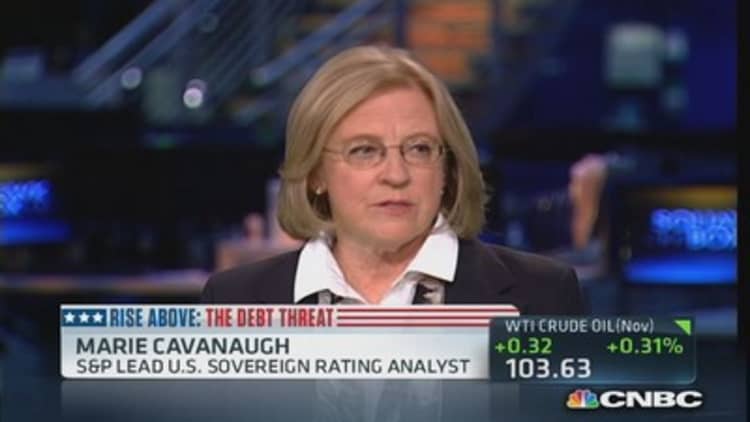
The standoff over funding the government and increasing the borrowing limit is "unlikely to change" Standard & Poor's AA plus rating on U.S. debt, S&P's managing director and lead analyst on U.S. sovereign ratings told CNBC on Friday.
But as the government shutdown entered its fourth day, Marie Cavanaugh said in a "Squawk Box" interview, "We estimate that the shutdown is probably costing about 0.3 percent off the quarterly growth rate for every week that it's shutdown continues."
The U.S. Treasury set Oct. 17 as the deadline for raising the debt ceiling. But that was before the shutdown, Cavanaugh pointed out, which causes the government to spending less. "So in an odd way it may move the date back a little bit," she said.
(Read more: Jack Lew's dilemma: Which bills to pay and when)
Cavanaugh added, "If the debt ceiling is not raised, the impact on the economy could certainly be much greater" than that of the shutdown. But she predicted that the limit would be increased on time.
On Thursday, the Treasury released an analysis of the "potential macroeconomic effects of the debt ceiling brinksmanship" based on the similar fight of two years ago that resulted in the U.S. losing its Standard & Poor's the sterling AAA credit rating. S&P's current AA plus rating has a stable outlook.
"In 2011, U.S. government debt was downgraded, the stock market fell, measures of volatility jumped, and credit risk spreads widened noticeably; these financial market effects persisted for months," the Treasury stated. "To be sure, other forces also played a role, but the uncertainty surrounding whether or not the U.S. government would pay its bills took a toll on the economy." Read the full report here.
Earlier this year, Cavanaugh said Standard & Poor's changed its U.S. outlook to stable "because of the improvement, in our view, in the deficit, which has fallen to about half of its level in 2011. Our expectation is it's going to continue to fall."
"A stable outlook means we think there's a less than 1-in-3 chance of a rating change over the next two years," she said.
(Read more: Buffett speaks out against DC's 'extreme idiocy')
Other considerations for improving the outlook, according to Cavanaugh: "Compromise in lessening the impact of the so-called fiscal cliff and ... because the economy has been on a stronger footing."
—By CNBC's Matthew J. Belvedere. Follow him on Twitter @Matt_SquawkCNBC.


